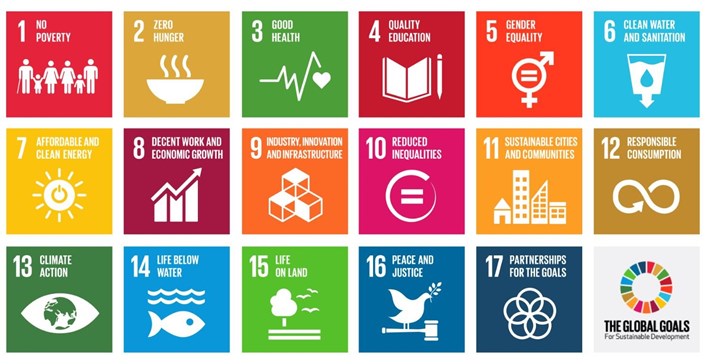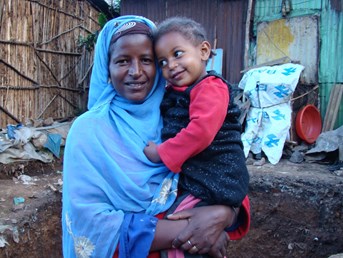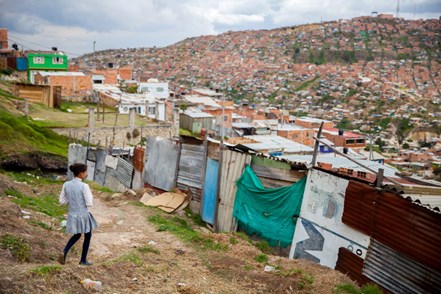Our Chief Executive Jenny Williams spoke this week at an event about “The Sustainable Development Goals (SDGs) and Northern Ireland”, organised by CADA and the Open University. Jenny discussed what international action is needed to help deliver the SDGs.
CADA (the Coalition of Aid and Development Agencies) NI brings together 27 aid and development agencies based in Northern Ireland, representing some 250,000 supporters. It raises awareness, promotes sustainable development, influences policy and supports organisations to be more effective.
The new Global Goals are universal, which means that nations must report on how they are advancing the SDGs at home and in other countries.
Tackling poverty means we need to measure improved outcomes for disadvantaged young people at home alongside our commitment to support development globally. What should that mean for the new Programme for Government?
The Global Goals are interlinked with progress on one target directly impacting others. Many of the campaigns which CADA agencies come together to campaign about can be linked to a number of the goals. Many of you will be aware of member agencies own campaigns including: Christian Aid’s Tax Justice Campaign, Trocaire’s campaign for Climate Justice and Oxfam’s Right to Refuge campaign.
At Habitat for Humanity our current global campaign Solid Ground is focused on access to land, which lies at the heart of ending poverty and directing links to SDG 11; sustainable cities and communities (see below).

The speed and scale of urbanisation is challenging our understanding of poverty and our interventions to alleviate it.
More than half of the world’s population now live in urban areas. By 2050, that figure will have risen to 6.5 billion people – two-thirds of all humanity. Sustainable development cannot be achieved without significantly transforming the way we build and manage our urban spaces.
Delivering on SDG 11 means making cities and human settlements inclusive, safe, resilient and sustainable, which requires urgent action and a collaborative approach that keeps people at the heart of plans and action.
It also involves investment in public transport, creating green public spaces, and improving urban planning and management in a way that is both participatory and inclusive.
How can we build the sort of cities we want to live in 20 years from now?
How can we ensure that ordinary workers aren’t priced out of the communities they serve and that cities are engines of opportunity for all?
In Northern Ireland, housing affordability, empty homes, social exclusion and the legacy of conflict are key issues facing deprived communities and vulnerable people.
Almost 40,000 people are on the social housing waiting list, around 32,000 homes are categorised as empty or void and more than 92% of social housing remains single identity. This requires urgent action.
Getting agreement on this new SDG framework which will shape the future for us all was in itself significant. Cooperation, collaboration and compromise, lobbying and influencing and campaigning from agencies. When the final framework was adopted by politicians there was celebration and a good degree of optimism but of course little concrete discussion about how the goals and targets will be implemented.
The Habitat III meeting in Ecuador in October is crucial in the development of the New Urban Agenda for the next 20 years. It will be the first real chance for stakeholders to think about how we will deliver safe and sustainable cities.
Those attending will need to identify and agree the most sustainable ways to achieve the targets; building appropriate capacity and skills multi-stakeholder engagement in all stages of urban development that build consensus, inclusion, resilience and sustainability.
We cannot ignore staggering inequalities, invisible borders in the form of social, cultural and economic exclusion.

Talking about the SDGs is important, but it can seem very far removed from the lives of the people most affected by global inequality. I had the privilege of meeting Neima, and her daughter Zaineba, who have benefited from Habitat’s Ethiopia work in the slums.
Come with me on a walk around her streets in Addis Ababa. There is little infrastructure or planning, no secure tenure or basic services. There's a strong smell of sewage and ground is uneven. It is claustrophobic and overcrowded. Few homes have a door that locks, many have leaking roofs, and holes in the walls. There is no clean water or proper sanitation; the pit latrines have slats which children fall through and die. How do you keep your children safe?
Yet the sums are a hive of activity. People like Neima are fighters, fighting for a better future. They are entrepreneurs and innovators, resourceful and resilient, finding ways to provide for their children.
Neima told me how a simple toilet has had a huge impact for the whole family – safer, cleaner, and healthier. An eco-stove means she spends less money on wood for cooking and that allows her to invest more money in education for Zaineba, it also means the whole family is healthier because there is less harmful smoke.
Cities have always been built by families growing incrementally but with the exponential growth in the last century, we need to find better ways to work. Walking in the slums in any of the world’s mega cities you will see the investments that families make in creating the best living conditions they can with limited resources and limited support.
We need to meet people where they are and build on existing resources so that people like Neima can be part of the solution and no longer part of the problem. We need to understand and work with the local context wherever that is; learning from the Global South, empowering and equipping local people where we can add value. In some parts of the world advocacy campaigns can limit development and restrict opportunities to help. But supporting grass roots advocacy is vital where it could be effective.
There are many examples of this within CADA member agencies and within Habitat. Earlier this year Habitat Poland helped secured the tenure of 240,000 social housing tenants in some of the poorest communities in Warsaw. This meant real change for real people.
As part of the Solid Ground campaign, Habitat Brazil is petitioning the Pernambuco Judiciary System and the State Government of Pernambuco to fairly compensate families forcibly evicted from their homes to make way for World Cup stadiums in 2013. After the Olympic Games they, and many others, are asking two big questions, 1) where will the families evicted from flavella’s to make way for the Olympic City live? 2) What will happen with the infrastructure built for the Olympic City?

The SDGs affect us all and we can all have a part in ensuring their delivery. This is an important opportunity to engage in conversation about how we will work together towards 2030, but of course it’s only a first step.
Northern Ireland is a small place but I believe that our scale can give us an opportunity for real engagement and real change. People in our part of the world are well known for their commitment to development.
I have no doubt about the generous response to global need, and the compassion which underpins that, but I have often thought that there is at least the potential that sectarianism at home makes it easier to work together globally. Northern Ireland’s very size and strong public engagement in development provides an opportunity to build understanding of the SDG framework and to develop policies which could model effective engagement for other places.
CADA members are working to deliver practical solutions and change systems, policies and attitudes to create a better world. Our commitment to work alongside people and communities is already collaborative and delivering impacts which transform lives. On its own that isn’t enough. Limited funding can create creative responses and foster innovation, and there are many examples where it does but limited capacity can also hinder further collaboration.
The SDG framework challenges us all to do more. Politicians are so important to this journey. We need to ensure that national and local governments, at every level understand the SDGs and create policies and processes which help implement the goals. We strongly encourage Stormont and all of our elected representatives to align policy with the global goals and to set measurable, achievable targets.
We need to be better about engaging business, such as InvestNI and others who work internationally, especially where they have the opportunity to actively influence pro-poor policies. I talked earlier about the need to meet people like Neima where they are and, in the same way, we need to start from where we are here.
The campaigns which I mentioned before on tax, climate change or to ensure refuge for those fleeing from the most inhuman conditions, as well as many others provide an opportunity for individuals and organisations to act today on issues which, whilst far from Ethiopia, do affect Neima and millions like her. In my view the SDGs, with their focus on universality and interconnectedness are about justice more than anything else.
I can end in no better way than with Nelson Mandela who, launching Make Poverty History said, “Like slavery and apartheid, poverty is not natural. It is man-made and it can be overcome and eradicated by the actions of human beings.”
That means all of us.
Join the Solid Ground campaign today. Add your voice to urge leaders to prioritise land for shelter. Sign our petition here.